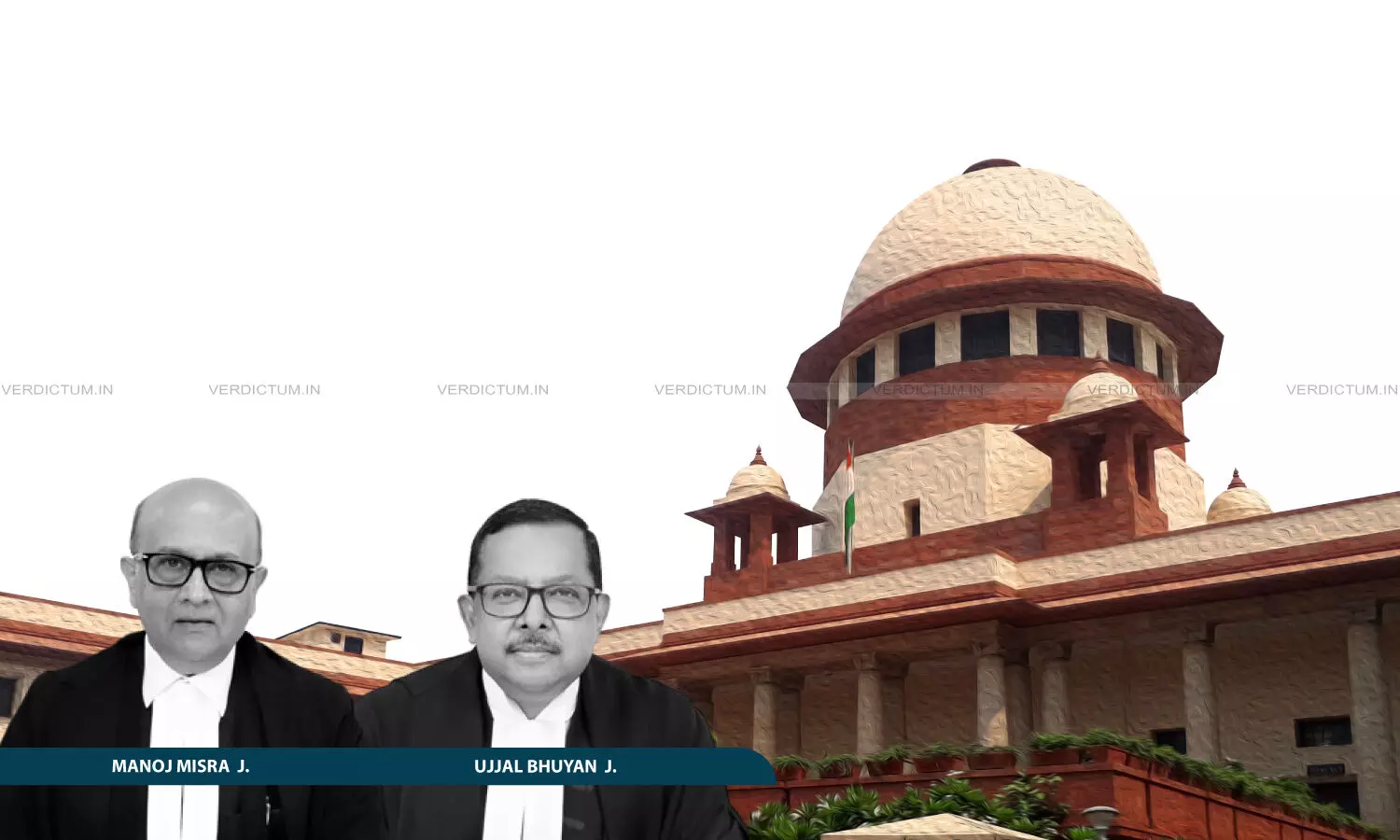
Justice Manoj Misra, Justice Ujjal Bhuyan, Supreme Court
No Bar on Filing Cheque Bounce Complaints U/S. 138 NI Act Against "SICK" Companies: Supreme Court
 |
|The Court clarified that while proceedings under Section 138 of the Negotiable Instruments Act can be initiated even against a company declared SICK under Sick Industrial Companies Act, the impact of a restraint order under Section 22A must be considered based on the nature of the order and the evidence in each case.
The Supreme Court has held that complaints under Section 138 of the Negotiable Instruments Act, 1881, can be filed against companies declared ‘SICK’ under the Sick Industrial Companies (Special Provisions) Act, 1985 (SICA). The Court ruled that the existence of a restraint order under Section 22A of SICA does not, by itself, bar such proceedings; rather, the effect of the restraint order has to be assessed on the facts of each case.
The Court was hearing a batch of criminal appeals arising from complaints filed for dishonour of cheques issued by a company declared sick by the Board for Industrial and Financial Reconstruction (BIFR). While the Magistrate had dismissed the accused’s application to recall summons, the revisional court discharged the accused, and the High Court refused to interfere.
A Division Bench of Justice Manoj Misra and Justice Ujjal Bhuyan, while allowing the appeals, observed: “Legal principles deducible from the decisions above, inter alia, are, (a) there is no embargo on filing a complaint under Section 138 of N.I. Act against a ‘SICK’ company; (b) even if there is a restraint order under Section 22A of SICA, the nature of the restraint order and the facts of that case would have to be considered before taking a decision whether the proceeding under Section 138 could continue or not; and, (c) the appropriate stage for taking such a decision would, ordinarily, be after parties have led their evidence.”
Advocate Ninad Laud appeared for the appellant, while Advocate Rishi Bhuta represented the respondents.
Background
The appellant, a textile company, had supplied goods to the respondent company. In part payment, the respondent issued several cheques, all of which were dishonoured on presentation due to insufficient funds. Statutory notices demanding payment were served, but the amounts remained unpaid.
Complaints were then filed under Sections 138 and 141 of the Negotiable Instruments Act. Based on the complaints and supporting affidavits, the Magistrate summoned the accused. The accused moved to recall the summons, arguing that the company had already been declared sick by BIFR and was subject to a restraint order prohibiting the disposal of assets.
The Magistrate dismissed the application. However, the revisional court allowed it, holding that the proceedings were barred in light of the BIFR order. The High Court upheld this view, leading to the present appeals before the Supreme Court.
Court’s Observations
The Supreme Court carefully examined the provisions of Section 22 and Section 22A of SICA. It noted that Section 22 imposes an embargo on disposal of assets for debt recovery but does not bar criminal proceedings under Section 138 NI Act. Section 22A, however, empowers BIFR to restrain disposal of assets, but its impact on cheque dishonour cases depends on the facts.
Referring to the restraint order passed by BIFR in this case, the Bench highlighted that the order itself permitted the company to use current assets for day-to-day operations. Since the cheques were issued against supplies made by the complainant, the Court held that whether they were issued in the ordinary course of business was a matter to be determined at trial, not at the threshold.
The Bench further stressed that the revisional court erred in recalling the summons, especially when the law is settled that trial courts have no inherent power to recall process once issued.
Conclusion
Setting aside the orders of the revisional court and the High Court, the Supreme Court restored the complaints to the Magistrate’s file. The Bench directed that the proceedings be carried forward in accordance with law.
“For the foregoing reasons, the appeals are allowed. The impugned judgment(s) and order(s) of the High Court as well as of the revisional court are set aside. The proceeding(s) on the complaints of the appellant, under Section 138 read with Section 141 of N.I. Act, shall stand restored on the file of the learned Magistrate.” the Court concluded.
Cause Title: Shree Nagani Silk Mills Pvt. Ltd. v. L.D. Industries Ltd. & Ors. (Neutral Citation: 2025 INSC 1064)
Appearances
Appellant: Advocate Ninad Laud
Respondents: Advocate Rishi Bhuta